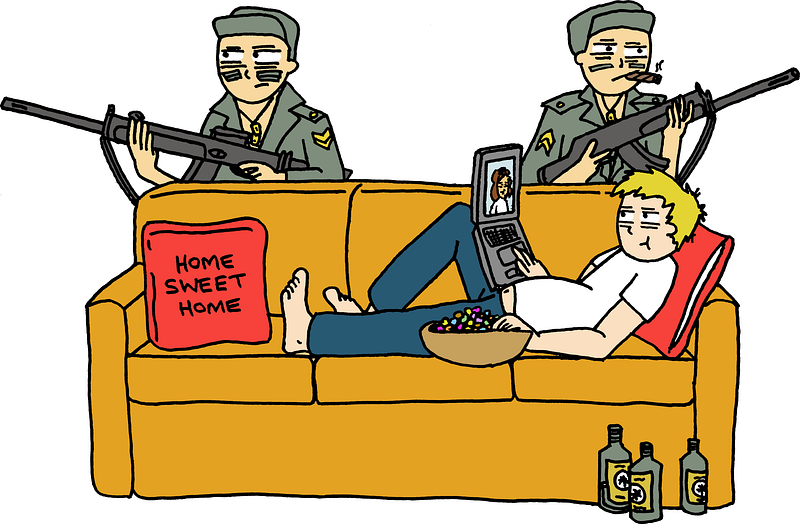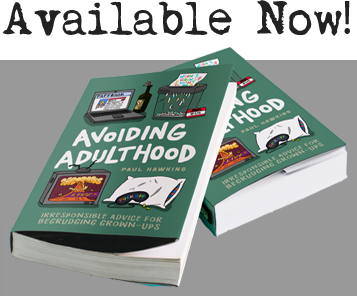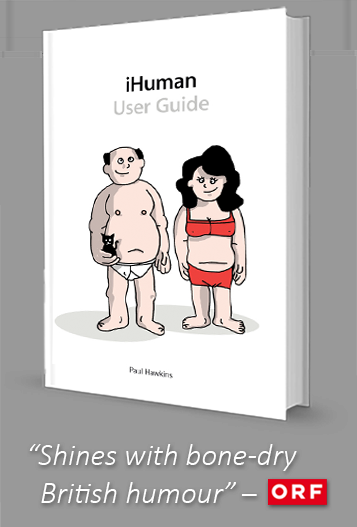
Ideology: Brexit, Trump and the Future of Humanity
The first thing that generally strikes smart, young adults about the world is not just how unfair and unapologetically insane it is, but how casually society seems to be responding to this arrangement. They might learn that there is enough food and buildings for everybody, for example, before somebody else tells them, “well, yes, but there’s not enough money to pay for them, so you need to get a job.”
At this point, flabbergasted, a smart, young adult would have to be pretty lacking in creativity if they didn’t next think, “What? Who’s in charge of this madness? These lunatics must be stopped!
Soon after, no doubt, they’ll probably stumble upon some set of clever-sounding ideas about how to make it all instantly better, also known as an ideology. This is a set of opinions which instantly allow an otherwise happy adult to imagine what the world could be instead, and then be immediately, unendingly disappointed by what it is not.
So far, so good. That’s your twenties sorted.
The more they learn more about politics, economics, and history, however, the more a creeping, uncomfortable realisation might start to settle in to the smart, young person’s head. The World— upon closer inspection — reveals itself to be almost infinitely complicated in every direction; complex, intricate and unhelpfully fragmented; famously tricky to unite and worryingly fragile to manage.
The more they learn about, like, you know, The System, man, the more they might become aware of the almost limitless ways it could go wrong. Some evils, uncomfortably, start to seem like necessary evils, and some bastards — much to their personal horror— become their bastards, as those bastards increasingly emerge as the lesser of all available bastards in the great, big possible bastard bag of life.
Essentially, the world they live in — with all its flaws, stupidity and entrenched unfairness — starts to not look so bad, compared to what it could be instead. With every passing book and newspaper, it looks less like some grand machinery could be wrestled from the forces of old and evil then steered into a bright tomorrow if enough people grab the wheel all at once. Instead, it looks more like a flimsy, long-running arts and crafts project, made of match-sticks and bits of old cereal box, with the occasional sequin for glamour, beset on all sides by a legion of limb-waving, sugar-addled toddlers, while a lone kindergarten volunteer or two try desperately to keep them at bay just long enough for the PVA glue to dry.
We call it civilisation.
Their idealism, after a messy enough collision with reality, might then slide into cynicism or apathy (“this world is stupid and broken and terrible and I want nothing to do with it!”) However, there’s something else it could become: a queasy, reluctant, begrudging, unenthusiastic kind of appreciation. For whatever reason, ‘civilisation’ in some clumsy, crappy form is presently ticking along. Slowly but surely, their mild and brewing paranoia that some global mischief is afoot might dissolve into a more sober, sympathetic and ultimately terrifying world-view: that civilisation might be nothing more than flawed, confused, ignorant, boring and ordinary people like them, trying their very best.
Oh god, the horror.
Indeed, probably the only thing more frightening than imagining a tight-knit global conspiracy of powerful elites in charge of everything is the realisation that there isn’t one. There’s no grand plan. There’s no plan. It’s all just people, in offices, sending e-mails, eating paninis, yawning, and no one knows what the hell is going on.
Given this sophisticated, horrible new understanding of their ignorance and impotence, political notions like ‘moderation’ – playing it safe and maintaining ‘the status quo’ – start to look more defensible than gathering all of their mates, covering their face, and charging towards the palace with a bunch of fire extinguishers and cricket bats. No.

Accepting that they probably live in a world where so much more could go wrong than is currently going wrong, it seems increasingly rational to just stick with whichever boring party or dead-eyed candidate is least likely to interrupt their as-yet unbroken, uncompromised access to beer and cheese. Bernie “I want to be Norway” Sanders starts to look infinitely safer than Donald “I want to melt the Middle-East” Trump, but — in the end — they’ll probably sleep easiest once the Americans abandon their giggly fling with Karl Marx and Ayn Rand, and begrudgingly marry Hillary “What would you like me to say?” Clinton. Yes, we all know she’s awful, but — in her defence — at least she’s awful in exactly the way we all know. “The Establishment” is established, after all, because the whole works has not yet fallen apart on their watch.
It’s hardly a strong opinion of support, but — if you’ve ever had a heated argument about politics with a member of a competing ideology — what you might have noticed is that strong opinions are the age-old nemesis of fun.
And so I turn to the U.K. referendum on leaving the E.U., which has inspired a surprising amount of very strong opinions. Indeed, there’s been so many outbursts of passionate conviction recently on the island, you’d think the issue involved tea.
For the less fanatical voter, however, it has been almost perfectly confusing. Even for those who normally have an ideology-donkey to pull their opinion cart, this referendum has failed to summon the usual clear decision. Membership of the E.U., it seems, is amongst those rare issues that can unite (and divide) the Right and Left equally. It is both a grand, bureaucratic tool of economic redistribution, and a market-unifying lever for greater freedom of goods and services. It is like a big, unwieldy socialist interfering thing, clumsily lubricating the market cogs of capitalism. Only with an issue so big and weird could the British political scene divide as it has, with Jeremy Corbyn, David Cameron and Nick Clegg on one side, and George Galloway, Boris Johnson and Nigel Farage on the other. It’s like the usual chess-board has been blasted with a power-hose and re-assembled by someone with a head injury.
How, then, should one make a pragmatic decision of this nature? Through which lens — house prices, immigration, GDP, industries, wages, prices, ideals — should we even squint at the binary choice on offer?
Well, luckily for us, one answer that both sides can agree on is fear. Both sides have accused the other of scare-mongering, and both sides have defended themselves from the claim. Britain should be afraid of Leaving the E.U., we are told, because of reasons A, B, and C, and yet we must also hold in mind the terrifying dangers of X, Y, and Z, which litter the horizons of Remaining.
So, if “Project Fear” is the most reliable way to chase the jittery and risk-averse to the voting booth, here are the three most terrifying reasons why I think Remaining seems less terrifying:

TERRIFYING REAL SUPER-FEAR #1 — NUCLEAR WAR!
We need peace between the world’s nations, because we’ve now become so good at making explosions, that the de-escalation of explosion-inspiring conflict is now essential. If the world — in a similar configuration as it is now — could stumble into the second world war, with the tinnitus of the trenches still ringing in its ears, I see only flimsy reasons to trust that we wouldn’t or couldn’t do it again, despite knowing in the abstract what it would likely mean. We are a world of institutional hierarchies — in other words, increasingly few egos, making increasingly big, unpleasant decisions. Combined with arrogance, stubbornness, ignorance, and irrationality — qualities a hundred thousand years older than the 50 megaton nuclear warhead — this is a frankly silly landscape for an “us and them” form of politics to play out in. With the totally unprecedented and modern impossibility of surviving another war (i.e. a third “world” one, which our current configuration of alliances could easily force upon us, from just the stubborn human escalation of one small squabble), the surest way to species-level safety, it seems to me, is to become so inter-dependant and inter-linked that it becomes practically impossible to trigger the traps set at our borders, by intentionally and methodically de-bordering the world as much as is feasibly possible. To aim, in other words — for a Great, Big United States of the European Union of Everyone ©.

TERRIFYING REAL SUPER-FEAR #2 — CLIMATE CHANGE!
Sorry if you’d already figured this out, but we need environmental health for no lesser reasons than existing. We’re hamsters, in the cage of Earth, and our owner is dead. If you think this situation is going to keep being fine indefinitely, you’ve never had a hamster. We probably don’t need to fear the total destruction of the human race just yet (some of us will find some way to survive, probably, because we’re nifty), but we really do have to worry on much, much nearer timescales about the frequency of extreme weather events and sea level rise, which threaten to create instability and mass human displacement like the world has never known. The ‘migrant crisis’ was a mere conga line, compared to what seems to be coming. Uninterrupted, this will be The Century of Refugees, going in any and all directions. 80% of the world’s population live on the coast, and the water’s edge also hosts an unhelpful amount of the world’s nuclear power plants, reliant as they are on a constant supply of wetness to cool their reactors. Ugh. Serious conversation on these topics suggests — well, let’s not depress ourselves — but, let’s just say, some stuff needs to be done, ok? So, answer yourself this: how is some stuff most likely to get done? By individual people, or by slowly growing grass-roots movements of idealists, or by massive, massive, pre-established institutions?

TERRIFYING REAL SUPER-FEAR #3 — GLOBAL INSTABILITY!
As boring and unromantically moderate as it sounds, we need civilisational stability to do everything else that’s good for us in the long-term: a serious enough shock to our increasingly interconnected global economy or political systems — a depression, a collapse in the dollar, runaway inflation — could affect everything else of significance that we’re quietly doing in the plodding, uncelebrated world outside of the rolling news headlines. Look at this list of notable people who endorse Leave and Remain, and see where the world’s scientists, academics, doctors, Nobel laureates, and inventors have thrown their weight. This is important. All of the cool and useful stuff that could just make the future maybe good and fine again, like medicine discovery and space programs and electric cars and vertical farms and lab-grown meat and renewable energy infrastructure, must all grow out of the soil of our present-day, fragile, political and industrial context, where the work of the world can Start or Stop, based on the erratic swing-o-meter of The Economy. Faced with the extent of what we don’t know about what we don’t know, how safe is it to touch the house of cards? We don’t know, obviously. So, please leave scientists and their money alone.

In relation to the U.K. referendum on E.U. membership, to me it all means this: no matter how good the arguments for Leaving are (and I think there are some good ones, mixed in with some silly, dangerous and confused ones), the arguments to Remain would still be better: it is easier to tackle global problems, the closer we go in the direction of global governance. The E.U. is a step in this direction; Brexit is a step away. We make war less probable and less possible, the less borders we have to war over. The E.U. is a step in this direction, Brexit is a step away.
As for the U.S. Presidential election, Mr Donald would be an entire tango backwards. He denies climate change, yet blunders ever forwards in the race to lead the planet, having paid no political price for believing himself smarter than scientists. Through the right ideological lens, Mr Donald could be everything that his most loyal supporters think he is — smart, strong, business-savvy, anti-establishment, straight-talking, patriotic, idealistic, incorruptible, great — and it would still be madness to let elect him, based on this one opinion alone. Ignore what he says about Mexicans, Muslims, Women, Walls, everything — Mr Donald must be hammered on this question, and this question only: what would you do, sat in earth’s most powerful seat, in earth’s most urgent time, to save it? His answer, whether he understands it or not, is fuck you, we’re going down with this ship.
This “save ourselves” bullshit of nation states is fast becoming fatally irrational. What we think of as ‘self-interest’, i.e. Britain’s self-interest (Think Brexit, UKIP), or the USA’s self-interest (Think Mr Donald), is near-sighted confusion. Our problems are bigger than national. On time-scales longer than an election or a presidency, it’s sado-masochistic, self-sabotaging, suicidal delusion, or — in Trump-speak— “not amazing.”

When we run out of antibiotics, we all run out together, and viruses will not stop at check-points, fences and walls. A nuclear winter would roll across all of our skies, and, when the swollen sea rises, it will not know who owns the cities that it swallows from the coast. A world of nuclear weapons and tense border-based disputes is insane. A world of climate-poisoning and countrified, competitive GDP-racing is lunacy. It is one planet; one eco-system; one species that lives in one food chain under its one sky.
House prices, immigration, GDP, industries, wages, prices, ideals … these issues seem important to individuals and communities. But when you zoom out to the level of civilizational stability, environmental health and existential safeguards, which are the context for them, they start to seem as problematic as an itch on your ankle, one moment after you’ve noticed your parachute wont open.
Increasingly global governance will, of course, be difficult, presumably in all the ways that E.U. membership and NAFTA membership is difficult — but who or what is offering a sensible alternative? There is not the time to design it. The I.M.F., W.T.O., W.H.O., U.N., World Bank, and all of the intra-national bodies from your favourite conspiracy theories are flawed and scary, yes, but they also hold a lot more hope of acting in the global, species-level interest than their smaller, older, and more locally self-interested equivalents. A bodge-job of a One World Government still sounds much more promising, after all, than the two hundred bloody Belgiums we’re currently working with.
Think, too, of the benefits, whatever your ideology: It’s ironic on a global scale to have taxes and tax havens. Justice’s limits are jurisdictions. Welfare and socialist programs struggle because of the migration incentives involved. Free trade, on the other hand, is hindered by tariffs, customs, and sanctions. Arguably, humanity’s biggest achievements so far, from the International Space Station, whizzing over our heads every 90 minutes, to the Large Hadron Collider, recreating the Big Bang beneath our feet, were pulled out of cross-border collaboration, contributed to by countries whose extracurricular activities include bickering, and generally being silly to and at each other.
Imagine all the money spent on the Space Race in the 20th Century, then imagine it had not been in two bank accounts, but one. For one cool, hippy idea of what a really good new long-term goal might look like, imagine all of the world’s money that it currently spends on militaries — from the moon, all you’d see is humanity’s great expense protecting itself from itself — and contemplate the directions that money could be diverted, if we could overcome the institutional expressions of our tribal monkey nonsense. A decent Mars trip, for example: we could ‘back up’ our civilisation, our culture, and the light of human consciousness, so everything we’ve done from Algebra to Wikipedia is no longer prone to evaporation from one unfriendly space rock or some fatal form of home-grown nuisance.
It is going to be uncomfortable and problematic and sticky and hard and exhausting, but we may have to do it anyway. Just as we know it is unpleasant, but rational, to suffer the boring, repetitious cruelties of diet/exercise now for a greater chance of future health, so I think that civilisation too should be viewed through this lens. Instead of imagining politics to be a massive game of Whack-a-Mole, where we manically try and hammer each and every new PROBLEM as it pops up, to be instantly replaced by a set of new and different ones, we could imagine governance in terms of what problems we could and should perhaps endure, given how much cooler it would be to join the universe’s aliens, rather than its dinosaurs.
If we could magically swap something— 10% of global GDP, or Australia, for example — for a new antibiotic, or the removal of 50 parts per million of carbon from the atmosphere, it would be worth it (sorry, Australia), because if we could just solve the problem of keeping the earth cool enough and not all dying in some Dark Age puddle of a super-plague, we might buy ourselves a hundred thousand lovely years to slowly solve the rest.
If all these risks sound exaggerated to you, here’s the question: are you definitely right, or is there any chance you could be unknowingly enjoying the usual fuzzy-sighted tunnel-vision of a person living inside a civilisation that is presently ticking along? History, after all, is nothing but a vast and ugly catalogue of counter-warnings against our native intuition that we live in safe and stable times; any study of what has already happened, indeed, reveals only an enthusiastic habit of great swathes of humanity to leap enthusiastically into whatever brand of dumb mess their place in history has offered them that afternoon.
We can not retreat from joining the world — we are in it, in every important and relevant respect, whether we like it or not. Nationalism is a childish symptom that we have not yet learned to see ourselves as we are: not a collection of distinctive groups and tribes, which look out in all directions upon a wide flat world, and mark lines upon the earth where our ideas of us and them begin, but a quiet outburst of surprisingly clever animals, invisibly peppering the skin of a little pearly marble, in a gossamer-thin shell of air, floating in a vast and inky sea of blackness, with only ourselves to rely upon to wrestle a future from the daft inertia of the past.











